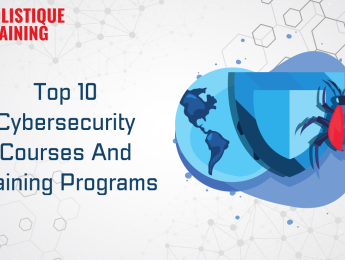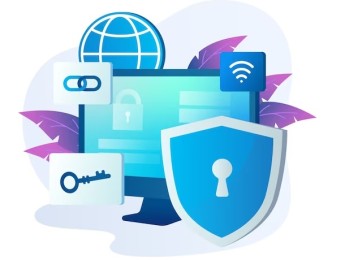- Table of Contents
- Introduction
- 1. Certified Information Systems Security Professional (CISSP)
- 2. Certified Ethical Hacker (CEH)
- 3. Certified Information Security Manager (CISM)
- 4. CompTIA Security+
- 5. Certified Cloud Security Professional (CCSP)
- 6. Offensive Security Certified Professional (OSCP)
- 7. Certified Information Systems Auditor (CISA)
- 8. GIAC Security Essentials (GSEC)
- 9. (ISC)² Systems Security Certified Practitioner (SSCP)
- 10. Cybersecurity Professional at Holistique Training
Introduction
Learning cybersecurity is essential in today's digital age, where protecting information and systems from threats is crucial. It encompasses a broad range of topics, including understanding security fundamentals, conducting risk assessments, managing access control, and securing software development. Gaining expertise in cybersecurity prepares individuals to handle incidents, manage identities, ensure compliance with regulations, and build resilient applications. Whether you're an aspiring professional or an experienced practitioner, mastering cybersecurity skills is vital for safeguarding digital assets and maintaining trust in technology.
1. Certified Information Systems Security Professional (CISSP)
Summary: The CISSP is a globally recognized certification in the field of IT security, covering a broad range of topics including risk management, network security, and software development security.
Duration: 6 months to 1 year (recommended study time)
Language: English
Level: Advanced
What does a CISSP course teach you? A CISSP course teaches you about various domains of cybersecurity, including asset security, security operations, and software development security. It provides knowledge on how to design, implement, and manage a best-in-class cybersecurity program.
Who should take CISSP course? This course is ideal for experienced security practitioners, managers, and executives interested in proving their knowledge across a wide array of security practices and principles.
Why should take CISSP course? You should take this course to validate your expertise and advance your career in cybersecurity. It is one of the most respected certifications in the field, often leading to higher salaries and more advanced job roles.
2. Certified Ethical Hacker (CEH)
Summary: The CEH certification provides a deep understanding of how to look for weaknesses and vulnerabilities in target systems, using the same tools and knowledge as a malicious hacker, but in a lawful and legitimate manner.
Duration: 5 days (course length) + self-study
Language: English
Level: Intermediate
What does a CEH course teach you? A CEH course teaches you how to think and act like a hacker, covering topics such as footprinting, scanning, enumeration, system hacking, and malware threats. It also includes practical labs for hands-on experience.
Who should take CEH course? This course is ideal for security officers, auditors, security professionals, site administrators, and anyone concerned about the integrity of network infrastructure.
Why should take CEH course? You should take this course to understand the mindset of hackers and learn how to protect systems against threats. It is a valuable certification for those looking to specialize in ethical hacking and penetration testing.
3. Certified Information Security Manager (CISM)
Summary: The CISM certification focuses on the management side of information security, teaching you how to manage and govern an enterprise’s information security program.
Duration: 4 months to 1 year (recommended study time)
Language: English
Level: Advanced
What does a CISM course teach you? A CISM course teaches you about information risk management, information security governance, incident management, and program development and management. It emphasizes the alignment of information security with business goals.
Who should take CISM course? This course is ideal for information security managers, aspiring managers, IT consultants, and risk management professionals.
Why should take CISM course? You should take this course to gain recognition in the field of information security management. It helps you develop skills to manage and oversee enterprise information security programs.
4. CompTIA Security+
Summary: CompTIA Security+ is an entry-level certification that validates baseline skills necessary to perform core security functions and pursue an IT security career.
Duration: 3 to 4 months (recommended study time)
Language: English
Level: Beginner
What does a CompTIA Security+ course teach you? A CompTIA Security+ course teaches you fundamental principles of network security, compliance and operational security, threats and vulnerabilities, application, data and host security, and identity management.
Who should take CompTIA Security+ course? This course is ideal for entry-level IT professionals, network administrators, and anyone looking to start a career in cybersecurity.
Why should take CompTIA Security+ course? You should take this course to build a solid foundation in cybersecurity. It is recognized globally and is a great starting point for a career in IT security.
5. Certified Cloud Security Professional (CCSP)
Summary: The CCSP certification focuses on cloud security architecture, design, operations, and service orchestration, emphasizing cloud data security.
Duration: 6 months to 1 year (recommended study time)
Language: English
Level: Advanced
What does a CCSP course teach you? A CCSP course teaches you about cloud data security, cloud platform and infrastructure security, cloud application security, and compliance and legal issues in the cloud.
Who should take CCSP course? This course is ideal for IT and information security leaders responsible for applying best practices to cloud security architecture, design, operations, and service orchestration.
Why should take CCSP course? You should take this course to validate your skills in cloud security and advance your career in securing cloud environments. It is highly respected and enhances your knowledge in managing cloud infrastructure security.
6. Offensive Security Certified Professional (OSCP)
Summary: The OSCP certification is a hands-on penetration testing certification, requiring candidates to successfully attack and penetrate various live machines in a controlled environment.
Duration: Varies (typically 3 months recommended study time + 24-hour exam)
Language: English
Level: Advanced
What does an OSCP course teach you? An OSCP course teaches you practical penetration testing skills, including network exploitation, buffer overflows, web application attacks, and network pivoting.
Who should take OSCP course? This course is ideal for penetration testers, ethical hackers, and security professionals looking to prove their skills through a challenging, hands-on exam.
Why should take OSCP course? You should take this course to demonstrate your practical ability to perform penetration tests and security assessments. It is highly respected in the industry for its rigorous and hands-on approach.
7. Certified Information Systems Auditor (CISA)
Summary: The CISA certification focuses on auditing, control, and assurance, preparing you to assess vulnerabilities, report on compliance, and institute controls within an enterprise.
Duration: 4 months to 1 year (recommended study time)
Language: English
Level: Advanced
What does a CISA course teach you? A CISA course teaches you about information system auditing processes, IT governance and management, protection of information assets, and IT service delivery and support.
Who should take CISA course? This course is ideal for IT auditors, audit managers, consultants, and security professionals.
Why should take CISA course? You should take this course to gain expertise in IT auditing, control, and assurance. It is recognized globally and enhances your ability to audit, control, and secure information systems.
8. GIAC Security Essentials (GSEC)
Summary: The GSEC certification validates a practitioner’s knowledge of information security concepts, techniques, and standards.
Duration: 3 to 6 months (recommended study time)
Language: English
Level: Intermediate
What does a GSEC course teach you? A GSEC course teaches you about network security, cryptography, incident handling, risk management, and security policies.
Who should take GSEC course? This course is ideal for security professionals, managers, auditors, and anyone interested in learning the fundamentals of information security.
Why should take GSEC course? You should take this course to validate your knowledge and skills in information security. It is a well-rounded certification that covers a wide range of security topics.
9. (ISC)² Systems Security Certified Practitioner (SSCP)
Summary: The SSCP certification is aimed at hands-on practitioners who are involved in implementing, monitoring, and administering IT infrastructure using information security policies and procedures.
Duration: 6 months to 1 year (recommended study time)
Language: English
Level: Intermediate
What does an SSCP course teach you? An SSCP course teaches you about access controls, security operations and administration, risk identification, monitoring and analysis, incident response and recovery, and cryptography.
Who should take SSCP course? This course is ideal for network security engineers, systems administrators, security analysts, and database administrators.
Why should take SSCP course? You should take this course to enhance your practical skills in information security implementation and management. It is a great certification for those involved in day-to-day IT security operations.
10. Cybersecurity Professional at Holistique Training
Summary: This course covers security fundamentals, risk assessments, access control, and securing software development. They prepare participants for certifications like CISSP and teach skills to create security frameworks, handle incidents, and comply with regulations. The courses focus on identity and access management, security operations, incident response, and secure software development methodologies.
Duration: 5 days
Language: English
Level: Advanced
What does the Cybersecurity Professional course teach you? The Cybersecurity Professional course teaches you security fundamentals, risk assessments, access control, and securing software development. It also covers creating robust security frameworks, handling security incidents, managing identity and access, security operations, and secure software development methodologies.
Who should take the Cybersecurity Professional course? This course is ideal for experienced security practitioners, managers, and executives looking to deepen their understanding of cybersecurity. It is also suitable for those preparing for advanced certifications like CISSP.
Why should you take the Cybersecurity Professional course? You should take this course to gain advanced knowledge and skills in cybersecurity, prepare for certifications like CISSP, and enhance your ability to create and manage security frameworks, handle incidents, and ensure regulatory compliance.
Table: Summary ofTop 10 Cybersecurity Courses And Training Programs
Course Name | Summary | Duration | Language | Level |
CISSP | Covers broad cybersecurity topics, including risk management, network security, and software development security. | 6 months to 1 year | English | Advanced |
CEH | Teaches ethical hacking, covering footprinting, scanning, system hacking, and malware threats. | 5 days + self-study | English | Intermediate |
CISM | Focuses on information security management, governance, risk management, and incident response. | 4 months to 1 year | English | Advanced |
CompTIA Security+ | Validates baseline skills for core security functions, including network security and compliance. | 3 to 4 months | English | Beginner |
CCSP | Focuses on cloud security architecture, design, operations, and service orchestration. | 6 months to 1 year | English | Advanced |
OSCP | Hands-on penetration testing certification, including network exploitation and web application attacks. | Varies (3 months + 24-hour exam) | English | Advanced |
CISA | Focuses on auditing, control, and assurance, preparing for information system auditing. | 4 months to 1 year | English | Advanced |
GSEC | Validates knowledge of information security concepts, techniques, and standards. | 3 to 6 months | English | Intermediate |
SSCP | Aimed at hands-on practitioners involved in implementing and administering IT infrastructure security. | 6 months to 1 year | English | Intermediate |
Cybersecurity Professional | Covers security fundamentals, risk assessments, access control, and securing software development. Prepares for certifications like CISSP. | 5 days | English | Advanced |
























